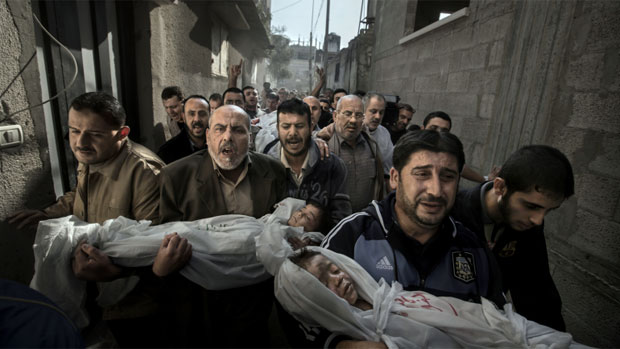World Press Photo of the Year was not a fake
Experts pored over stunning image of Gaza burial after claims surfaced it was 'stitched together'

A free daily email with the biggest news stories of the day – and the best features from TheWeek.com
You are now subscribed
Your newsletter sign-up was successful
THE old adage that 'the camera doesn't lie', has been severely tested once again, after the winner of the prestigious 2013 World Press Photo of the Year was accused of being a "fraudulent forgery".
Swedish photojournalist Paul Hansen's winning picture was taken on 20 November last year and shows the bodies of two Palestinian children killed in an Israeli missile strike in Gaza City being carried down an alleyway. Gaza Burial is undeniably powerful, but shortly after it was declared the winner of photojournalism's top prize in February, rumours began to circulate that it had been extensively manipulated by image editing software. The most contentious issue was the "incredible lighting" on the grieving men's faces.
The controversy went public when a forensic image analyst called Neal Krawetz added a post to his blog claiming that his analysis of the image suggested it had been "significantly altered". Krawetz, who examined the history of changes made to the picture using Photoshop, concluded that Hansen had stitched together three versions of the scene to create a single, arresting frame.
The Week
Escape your echo chamber. Get the facts behind the news, plus analysis from multiple perspectives.

Sign up for The Week's Free Newsletters
From our morning news briefing to a weekly Good News Newsletter, get the best of The Week delivered directly to your inbox.
From our morning news briefing to a weekly Good News Newsletter, get the best of The Week delivered directly to your inbox.
Krawetz's claims were picked up by the extremetech website, which suggested it was only a matter of time before Hansen was stripped of his award. Explaining why the photographer would have manipulated the image, the website said: "Later, realizing that his most dramatically situated photo was too dark and shadowy, [Hansen] decided to splice a bunch of images together and apply a liberal amount of dodging [brightening] to the shadowy regions."
Hansen vehemently denied accusations he had manipulated his picture in a way that contravened photojournalism's "currently accepted standards" of digital retouching. But World Press Photo, concerned by the growing controversy, appointed two experts to analyse the winning frame.
Dr Hany Farid, professor of computer science at Dartmouth College, and Kevin Connor, the CEO of the image authentication company Fourandsix Technologies, examined Hansen's RAW file of Gaza Burial – the original unaltered copy of the image captured by the camera. They concluded that Hansen had applied a "fair amount of post-production, in the sense that some areas have been made lighter and others darker". But Farid and Connor "ruled out" any suggestion the image was a composite. As a result, Gaza Burial has been reconfirmed as the 2013 World Press Photo of the Year.
Hansen told news.com.au he was pleased to be vindicated. "I have never had a photograph more thoroughly examined, by experts and different photo-juries all over the world," he said. "The photograph is certainly not a composite or a fake".
A free daily email with the biggest news stories of the day – and the best features from TheWeek.com
-
 Antonia Romeo and Whitehall’s women problem
Antonia Romeo and Whitehall’s women problemThe Explainer Before her appointment as cabinet secretary, commentators said hostile briefings and vetting concerns were evidence of ‘sexist, misogynistic culture’ in No. 10
-
 Local elections 2026: where are they and who is expected to win?
Local elections 2026: where are they and who is expected to win?The Explainer Labour is braced for heavy losses and U-turn on postponing some council elections hasn’t helped the party’s prospects
-
 6 of the world’s most accessible destinations
6 of the world’s most accessible destinationsThe Week Recommends Experience all of Berlin, Singapore and Sydney
-
 Epstein files topple law CEO, roil UK government
Epstein files topple law CEO, roil UK governmentSpeed Read Peter Mandelson, Britain’s former ambassador to the US, is caught up in the scandal
-
 Iran and US prepare to meet after skirmishes
Iran and US prepare to meet after skirmishesSpeed Read The incident comes amid heightened tensions in the Middle East
-
 Israel retrieves final hostage’s body from Gaza
Israel retrieves final hostage’s body from GazaSpeed Read The 24-year-old police officer was killed during the initial Hamas attack
-
 China’s Xi targets top general in growing purge
China’s Xi targets top general in growing purgeSpeed Read Zhang Youxia is being investigated over ‘grave violations’ of the law
-
 Panama and Canada are negotiating over a crucial copper mine
Panama and Canada are negotiating over a crucial copper mineIn the Spotlight Panama is set to make a final decision on the mine this summer
-
 Why Greenland’s natural resources are nearly impossible to mine
Why Greenland’s natural resources are nearly impossible to mineThe Explainer The country’s natural landscape makes the task extremely difficult
-
 Iran cuts internet as protests escalate
Iran cuts internet as protests escalateSpeed Reada Government buildings across the country have been set on fire
-
 US nabs ‘shadow’ tanker claimed by Russia
US nabs ‘shadow’ tanker claimed by RussiaSpeed Read The ship was one of two vessels seized by the US military